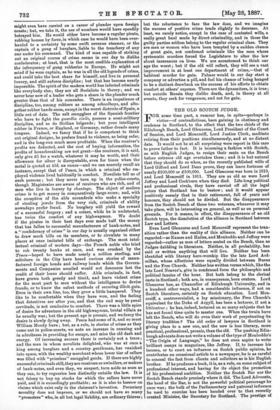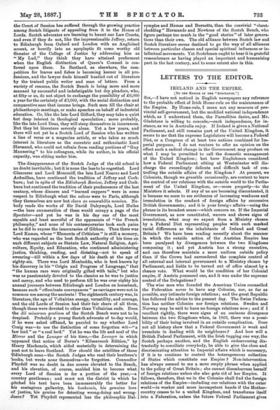THE OLD SCOTCH JUDGE.
FOR some time past, a rumour has, in spite—perhaps in virtue—of contradictions, been gaining in obstinacy and credence in Scotland, to the effect that the two chiefs of the Edinburgh Bench, Lord Glencorse, Lord President of the Court of Session, and Lord Moncreiff, Lord Justice Clerk, meditate retiring from their positions simultaneously, and at no distant date. It would not be at all surprising were report in this case to prove father to fact. It is becoming a fashion with Scotch, as with English Judges, to resign their seats on the Bench before extreme old age overtakes them ; and it is but natural that they should do so when, as the recently published wills of Lord Gifford and Lord Delta prove, they can leave fortunes of nearly £200,000 or £100,000. Lord Glencorse was born in 1810, and Lord Moncreiff in 181L They are as old as were Lord Jeffrey and Lord Cockburn when they died. Lifelong political and professional rivals, they have carried off all the legal prizes that Scotland has to bestow; and it would appear positively seemly that in their retirement, full of years and honours, they should not be divided. But the disappearance from the Scotch Bench of these two veterans, whenever it may take place, will be interesting on general, as well as on personal grounds. For it means, in effect, the disappearance of an old Scotch type, the dissolution of the alliance in Scotland between Law and Lettere.
Even Lord Glencorse and Lord Moncreiff represent the tran- sition rather than the reality of this alliance. Neither can be regarded—as Eames and Hailer', and Monboddo and Jeffrey were regarded—rather as men of letters seated on the Bench, than as Judges dabbling in literature. Neither, in all probability, has said or written anything that will live. Neither has been identified with literary hero-worship like the late Lord Ard- millan, whose affections were equally divided between Barns and the Free Church. Neither has written verses which, like the late Lord Neaves's, give in condensed form the philosophic and political fancies of the hour. But both belong to the clerical caste in Scotland ; both are, in consequence, born orators. Lord Glencorse has, as Chancellor of Edinburgh University, and in a hundred other ways, bad a considerable influence, if not on Scotch literature, certainly on Scotch education. Lord Mon- creiff, a controversialist, a lay missionary, the Free Church's equivalent for the Duke of Argyll, has been a lecturer, if not a litterateur ; he has, indeed, lectured on so many subjects that he has not found time quite to master one. When the twain have left the Bench, who will do even their work of perpetuating its literary tradition P The old order of lawyers in Scotland is giving place to a new one, and the new is less literary, more practical, professional, prosaic, than the old. The pushing Edin- burgh advocate does not write a volume of the type of Monboddo's "The Origin of Language," he does not even aspire to write brilliant essays in magazines, like Jeffrey. If, to increase his income, or to exert an influence on Scotch public opinion, he contributes an occasional article to a newspaper, he is as careful to conceal the fact from clients and solicitors as is his English brother. If he produces a book, it is, as a rule, on some subject of professional interest, and having for its object the promotion of his professional ambition. Neither the Scotch Bar nor the Scotch Bench stands precisely where it did. The Lord Advocate, the head of the Bar, is not the powerful political personage he once was ; the bulk of the Parliamentary and patroual influence he used to exercise has been handed over to that recently created Minister, the Secretary for Scotland. The prestige of
the Court of Session has suffered through the growing practice among Scotch litigants of appealing from it to the House of Lords. Scotch advocates are learning to haunt our Law Courts, and even if they do not, like the impressionable Jeffrey, return to Edinburgh from Oxford and London with an Anglicised accent, or horrify into an apopleptic fit some worthy old Senator of the College of Justice by addressing him as -" My Lnd," they think they have attained preferment when the English distinction of Queen's Counsel is con- ferred upon them. In Scotland, as elsewhere, the com- petition for loaves and fishes is becoming keener in all pro- fessions, and the lawyer finds himself hustled out of literature by the trained public writer and man of letters. From a variety of reasons, the Scotch Bench is being more and more manned by successful and indefatigable but dry pleaders, who, at fifty or so, do not object to exchange the possibility of £6,000 a year for the certainty of £3,000, with the social distinction and comparative ease that income brings. Such men fill the chair at philanthropic meetings, or make speeches on behalf of industrial education. Or, like the late Lord Gifford, they may take a quiet but deep interest in theological speculation ; more probably, like the late Lord Peas, they will steep themselves in insurances. But they let literature severely alone. Yet a few years, and there will not yet be a Scotch Lord of Session who has written a line of verse or a magazine article, or who takes as much interest in literature as the eccentric and enthusiastic Lord illermand, who could not refrain from reading portions of "any Mannering " to his colleagues, while its author, in his official -capacity, was sitting under him.
The disappearance of the Scotch Judge of the old school is no doubt inevitable ; but it is none the less to be regretted. Lord Glencorse and Lord MoncreK the late Lord Neaves and Lord Ardmillan, have continued the tradition of Jeffrey and Cock- burn; but in spite of the Edinburgh Beview, Jeffrey and Cock- burn but continued the tradition of their predecessors of the last century, whose dinners and "learned suppers" were in some -respect to Edinburgh what the salons were to Paris, although they themselves are now but dare ac venerabilia nomina. No- body reads the works of Sir David Dalrymple, Lord Hailes —the bare enumeration of them would occupy a page of the Spectator—and yet he was in his day one of the most 'capable and least merciful of the opponents of "the French philosophy," and none of his contemporaries took such pains as he did to expose the inaccuracies of Gibbon. Then there was Lord Karnes, whose "Elements of Criticism " is still a memory, who was regarded as the best Scotch authority of his time on such different subjects as Statute Law, Natural Religion, Agri- culture, Equity, and Education, who continued administering justice, thinking, reading, and dictating—not to speak of swearing—till within a few days of his death at the age of eighty-six. There was Lord Monboddo, who ie best known by his discovery in his " Origin and Progress of Language," that the human race were originally gifted with tails," but who was as passionately devoted to the classics as he was to justice and mercy, and who used to perform till be was over eighty his Annual journeys between Edinburgh and London on horseback, because such "effeminate conveyances " as carriages were not in common use among the ancients ! The eighteenth century was, in 'literature, the age of Voltairian energy, versatility, and courage, and the old Lords of Session had their fair share of all three, though these were devoted to other than Voltairian ends. Even the dii minorum pentium of the Scotch Bench were not to be despised. Probably a young Scotch advocate of to-day would, if he were asked offhand, be puzzled to say whether Lord 'Craig was—to use the distinction of some forgotten wit—" a law lord " or " a real lord." Yet he was the life and soul of the Mirror and the Lounger of his time,—the Lounger in which 'appeared that notice of Burns's "Kilmarnock Edition," by Henry Mackenzie, which aided materially in determining the poet not to leave Scotland. Nor should the satellites of these Edinburgh suns—the Scotch Judges who read their brethren's 'books, but wrote none themselves—be forgotten. Counsellor Pleydell was no doubt in due course elevated to the Bench, and his elevation, of course, enabled him to become what -every Lord of Session is for a portion of the year,—a country gentleman ; and must not the district in which he pitched his tent have been immeasurably the better for lie contagious gallantry, his bonhomie, his genuine love of justice, his genius for detecting wrong-doing and wrong- aloerel) Yet Pleydell represented less the philosophic Dal-
rymples and Homes and Barnette, than the convivial " claret- shedding " Hermands and Newtons of the Scotch Bench, who figure perhaps too much in the "good stories" of later genera- tions than their own. The old alliance between Scotch law and Scotch literature seems destined to go the way of all alliances between particular classes and special spiritual influences or in• tellectual movements. Yet Scotchmen ought to bear it in grateful remembrance as having played an important and humanising part in the last century, and to some extent also in this.



































 Previous page
Previous page